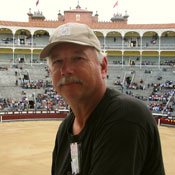I huddled in the doorway trying, without much success to get some relief from the blowing snow and the cold. The bowling alley had closed many hours before, and it was a lonely and dark place now.
"What do I do if the terrorists decide my bowling alley would be their next target?" I asked myself. Although armed with a weapon, a standard U.S. Army-issue M16, the Army hadn't issued any ammunition to go with it. The bayonet was attached, but the scabbard was strapped onto the blade, and if something surprised me, there was no way it would come off in a hurry, encumbered as I was with all my cold-weather gear.
Since the bowling alley was set back from the main street in a little depression, it wasn't very visible, and without any way to communicate with anyone if the terrorists did come, I'd be alone. My 17-year-old soul shivered, not just from the cold. The terrorists, the Baader-Meinhof gang, who were trained in violence in the Middle East by the best, had been menacing this corner of Europe for months now, and the U.S. Army had beefed up security at its installations during the Christmas season in 1971.
Flash forward to Christmas season 2016 in Strasbourg, France. Huddled in the doorway away from the driving rain, I sipped my glass of "vin chard," a hot mulled wine that is a favorite at the Christmas markets in France (the Germans also call it "gluhwein"). I watched the soldiers pick their way through the festive crowd. There were four of them—they always came in fours, and they never stood together. They wore camouflage with desert-tan boots, and they carried the FAMAS assault rifle that the French military uses. Their hands were on the pistol grip with the barrel sloped down from right to left across their chests (if they were right handed). An ammunition clip completed each rifle.
Sometimes, you could see a more slender form in the group of soldiers, which indicated that a young woman was serving her country.
I watched as they scanned the crowd and thought to myself that once again this corner of the world, close to where I was in 1971, is being terrorized by a small group of extremists who believe that their ideology gives them the right to kill and maim in order to bring about their world view.
"The Simpsons" once called the French "cheese-eating surrender monkeys," and in many people's minds, they are more lovers than fighters. But the French, reeling from two years of bloody terrorist attacks, have not given in. The Christmas markets go on in Strasbourg, but they have all been moved downtown in the ancient city surrounded by water now plied by the famous "Bateaux Mouche" tourist boats.
But now the water is once again used for defense. Many of the footbridges leading to the island are closed, and other bridges are heavily guarded. The city has parked some of its fleet of trash trucks, covered in Christmas cheer, on the bridges to narrow the roadway. The bridges where the trams enter the island have cobblestones in a checkerboard pattern to prevent anyone from driving down the tracks. Recently, the French arrested a terrorist cell here in Strasbourg. Some members appeared to have been well-liked community members and showed no signs of radicalization.
Strasbourg calls itself "The Capital of Christmas," and with heightened security, tourists arrive by the boatload. They drink vin chaud and eat bowls of delicious spaetzle or try an Alsatian sausage and look for gifts in the markets. But as I watch the hustle and bustle and the elaborate security, I can't help but wonder how disappointed the Prince of Peace must be as we celebrate his birthday amidst the lack of progress we have made.
R.H. Coupe, a longtime resident of Mississippi, is currently living and working in Strasbourg, France, with his reluctant wife and youngest child.



Comments
Use the comment form below to begin a discussion about this content.
comments powered by Disqus